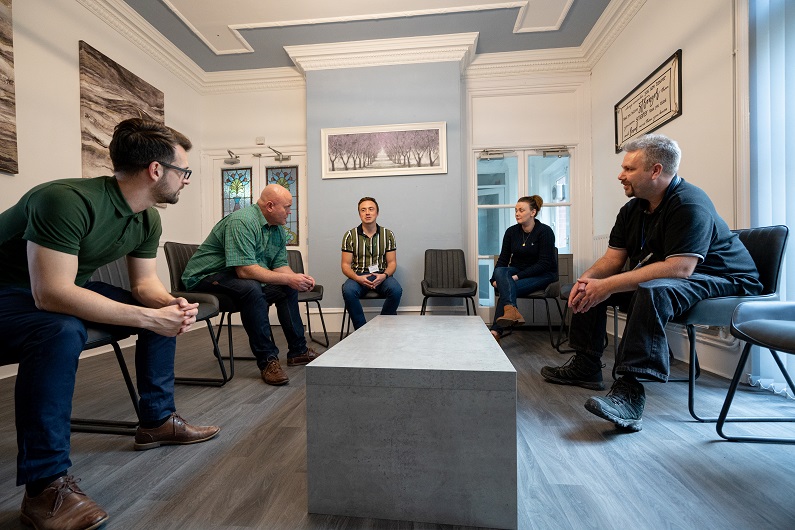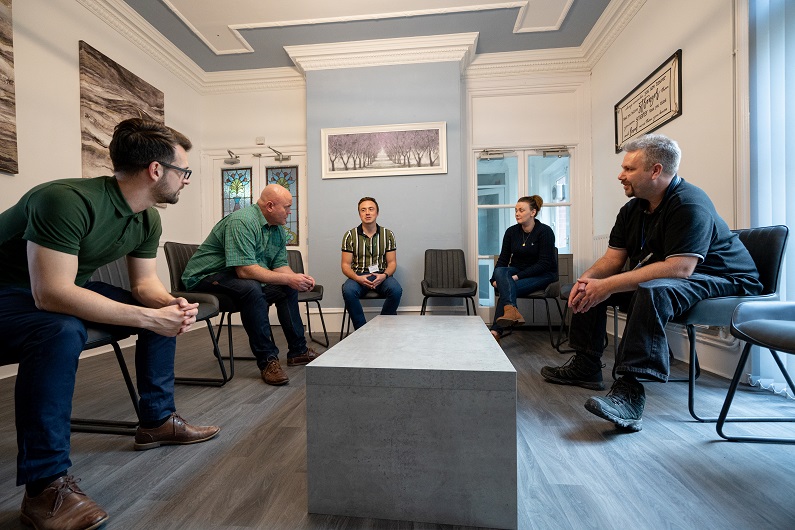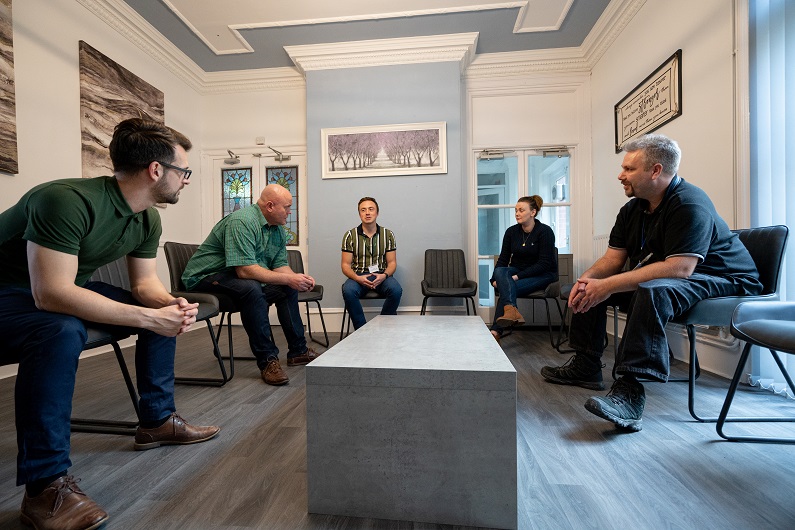20+ Years Experience
Specialist Drug Addiction Clinics

Are you or a loved one struggling with a painkiller addiction? Confronting this issue can be overwhelming, but there’s hope.
In this blog post, we’ll guide you through a comprehensive treatment plan, providing valuable insights and strategies for painkiller addiction treatment to reclaim control over your life and overcome addiction.
Painkiller addiction is a complex issue that requires a deeper understanding to effectively address it.
Prescription painkiller abuse, which often involves prescription opioids, is closely related to opioid addiction, with various causes and risk factors. Painkiller addiction affects individuals in numerous ways.
Grasping the nature of addiction is critical in seeking help, as it enables individuals and their loved ones to make informed decisions about recovery.
Prescription drugs, particularly opioids such as codeine and oxycodone, have a high potential for addiction and abuse.
While over-the-counter painkillers are less potent and present a lower risk of misuse, prescription opioids or stronger painkillers pose a significant danger to those who take them.
Codeine addiction can develop quickly. In as little as 3 to 5 days of continuous use, it can take hold of a person.
Understanding the types of prescription painkillers is vital in addressing painkiller addiction and seeking appropriate treatment.
Painkiller addiction can result from a combination of factors, including genetic predisposition, environmental influences, and misuse of prescription medications.
For example, an individual with a family history of addiction may be more susceptible to developing an addiction to painkillers.
Additionally, improper use of prescription medications can lead to physical changes in nerve cells in the brain, resulting in physical dependence and addiction.
Identifying the causes of painkiller addiction is a crucial step towards seeking effective treatment.
Detecting the signs of painkiller addiction early is essential for intervention and successful recovery.
By being aware of the physical and psychological symptoms associated with addiction, individuals and their loved ones can take the necessary steps to seek help and regain control over their lives.
Early detection is key to successful recovery. Knowing the signs of addiction can help individuals and their loved ones.
Physical symptoms of painkiller addiction can be subtle but may include drowsiness, constipation, and respiratory depression.
These symptoms may seem harmless or unrelated to addiction; however, they can indicate a growing dependence on prescription drugs.
Recognising and addressing these physical effects is a vital step toward breaking free from the cycle of addiction.
Psychological symptoms of painkiller addiction can be equally as telling as physical symptoms. Mood swings, anxiety, and severe depression may manifest in those struggling with addiction.
These symptoms can be indicative of a deeper issue and should not be ignored.
Addressing psychological symptoms alongside physical symptoms can greatly improve the chances of successful recovery.
If you are struggling with your mental health, our medical team offer dual diagnosis to help you with your mental health and drug abuse problem.
Taking the first step to seek help for painkiller addiction is crucial for recovery. It requires open communication, understanding, and the courage to face the issue head-on.
Both individuals struggling with addiction and their loved ones must work together to find the most appropriate treatment center to ensure long-lasting recovery.
Finding the right treatment plan is a process that requires patience and dedication. It is important to research.
When approaching a loved one about their painkiller opioid addiction, it’s important to use empathy, understanding, and support.
Avoid being judgmental or confrontational, as this may only push them further away. Instead, be ready to listen, provide assistance, and guide them toward the help they need.
Remember that drug addiction is a complex issue, and overcoming it requires patience and compassion from everyone involved.
Finding professional help for over-the-counter or prescription painkiller addiction involves researching treatment options, including drug addiction treatment, and selecting the most suitable program.
This may include detoxification, medication-assisted treatment, therapy, and counselling.
It’s important to consult with a professional to ensure the chosen treatment plan is tailored to the individual’s unique needs and circumstances.
With the right support and guidance, recovery from drug dependence is possible.
There are various painkiller addiction treatment options available for treating painkiller addiction, each designed to address different aspects of the recovery process.
By understanding the available treatments, individuals can make informed decisions and tailor their recovery plan to their specific needs.
It is important to remember that no single treatment is right for everyone. Different people respond differently.
Detoxification is the process of eliminating addictive substances from the body, often accompanied by withdrawal symptoms.
This critical first step in treatment helps pave the way for long-term recovery by cleansing the body of the addictive substance and allowing individuals to focus on addressing the underlying causes of their addiction.
Proper medical supervision and support during detoxification can help manage painkiller and opioid withdrawal symptoms and ensure a safe and comfortable experience.
Substance use disorders can be hard to overcome on your own. The addiction specialists at our detox facility can help you cut down and eventually stop your painkiller consumption.
Medication-assisted treatment involves using medications such as methadone or buprenorphine to manage withdrawal symptoms and intense cravings in individuals dealing with drug abuse.
These medications can help individuals maintain their recovery from drug use by reducing the physical discomfort associated with withdrawal symptoms and decreasing the risk of relapse.
It’s essential to work closely with a professional to determine the most appropriate medication for each individual’s needs.
Misusing painkillers can lead to negative consequences such as legal problems, health problems and various other issues.
Some individuals may even develop a mental health condition relating to their painkiller use. Our rehabilitation centres offer various treatment programmes and medically assisted treatments to suit individual needs.
Therapy and counselling play a crucial role in addressing the underlying causes of addiction and teaching coping strategies for long-term recovery.
Through various therapeutic approaches, such as cognitive-behavioural therapy and contingency management, individuals can gain valuable insights into their addiction and learn how to manage triggers and maintain sobriety.
Addiction treatment, therefore, relies heavily on these methods to ensure lasting success.
Ongoing therapy and counselling can provide the support and guidance needed to navigate the challenges of recovery and prevent relapsing.
We can provide outpatient programmes with different doctors as well as personalised therapy to ensure you get the best long term treatment.
Managing pain without painkillers involves exploring alternative treatments and therapies to reduce reliance on opioids.
By finding effective ways to manage physical pain without addictive substances, individuals can live a healthier, pain-free life without the risk of developing a prescription drug addiction.
Alternative treatments and therapies can include therapy, massage, acupuncture, yoga, and other forms of therapy.
Non-opioid drugs can provide effective pain relievers with a lower risk of addiction.
These medications, such as non-steroidal anti-inflammatory drugs (NSAIDs), acetaminophen, and corticosteroids, offer alternative options for managing mild to severe pain without the dangers associated with prescribed opioid drugs, which are often prescription pain relievers.
It’s important to consult with a medical professional before taking any non-opioid medication, as they can interact with other medications and lead to potential side effects.
Therapy and exercise can help improve mobility, strength, and overall well-being, reducing the need for opiate painkillers.
By working with a physical therapist and engaging in regular exercise, individuals can manage their pain more effectively and decrease their reliance on addictive substances.
A variety of exercises and therapies, such as stretching, pain-relief exercises, and activities that enhance balance, can be incorporated into a comprehensive pain management plan.
Mind-body techniques such as meditation, relaxation, and biofeedback can help manage pain without the use of addictive substances.
By learning to harness the power of the mind, individuals can better understand and control their pain, leading to a decreased need for painkillers.
Incorporating these techniques into daily life can provide long-term benefits for overall health and well-being.
Preventing painkiller addiction relapse requires ongoing support, self-awareness, and coping strategies.
By remaining vigilant and committed to recovery, individuals can maintain their sobriety and continue to live healthy, fulfilling life free from addiction.
Recovery is a lifelong process that requires dedication and hard work. It is important to remember.
Building a support network of friends, family, and professionals can provide encouragement and accountability during recovery.
This network can offer emotional assistance, help mitigate stress, and provide a sense of belonging during the rehabilitation process.
By connecting with others who understand the challenges of addiction, individuals can draw strength and inspiration from their shared experiences.
Identifying and coping with triggers helps prevent relapse by addressing the root causes of addiction.
By recognising and managing these triggers, individuals can develop healthy coping strategies to overcome cravings and maintain their recovery.
Mindfulness, deep breathing, and relaxation techniques can all be utilised as tools for managing triggers and maintaining sobriety.
Ongoing therapy and support groups provide a safe space for individuals to share experiences, learn from others, and maintain long-term recovery.
By participating in these groups, individuals can gain valuable insights, develop new coping strategies, and build a strong support network to help them stay on track with their recovery goals.
Staying committed to therapy can play a crucial role in preventing relapse and ensuring lasting recovery.
In conclusion, overcoming painkiller abuse is a challenging but achievable goal.
By understanding the nature of addiction, recognising the signs, seeking treatment, and exploring various treatment options, individuals can regain control over their lives and achieve lasting recovery.
With ongoing support, self-awareness, and the implementation of healthy coping strategies, individuals can prevent relapse and live a fulfilling life free from the grip of addiction.
Remember, you are not alone in this journey, and there is hope for a brighter, healthier future.
Treating addiction to painkillers involves a comprehensive approach, including medical supervision, medications such as methadone and buprenorphine (Subutex), non-opioid drugs, physical rehabilitation, and psychological therapies.
These treatments can help create a successful plan for self-management of pain.
To prevent getting addicted to painkillers, work with your doctor to take the lowest dose possible for the shortest time needed.
We recommend having 1 physician provide all pain medication prescriptions and consider non-psychotropic medications or other ways to treat your pain.
Additionally, talk with your doctor or counsellor about any problems you have and your drug use.
Prescription drug addiction can cause liver and kidney damage, seizures, and tolerance to higher doses.
It can be a very dangerous and life-threatening situation.
Common triggers for painkiller addiction relapse include stress, boredom, loneliness, and exposure to reminders of the addiction such as certain people, places, or things.
Non-opioid drugs, such as NSAIDs, acetaminophen, and corticosteroids, are an effective way to manage chronic pain while minimising the risk of addiction.
These medications can be used to reduce inflammation, relieve pain, and improve mobility.
They are generally safe and well tolerated and can be used in combination with other treatments, such as talking therapies and holistic approaches, to maximise pain relief.
If you are suffering from substance abuse, make sure to speak to our team today.
There are a range of other services that we can provide. Have a look at the list below for more information:






















We Aim To Reply To All Enquiries With-in 24-Hours